If you’re curious about the foods chickens can eat – and those they can’t – you’ve come to the right place!
Many people decide to raise chickens because they are versatile little creatures that can eat just about anything. In fact, feeding chickens things like kitchen scraps and leftovers is a great way to cut down on your overall feed costs, and to make the most of food and yard waste.
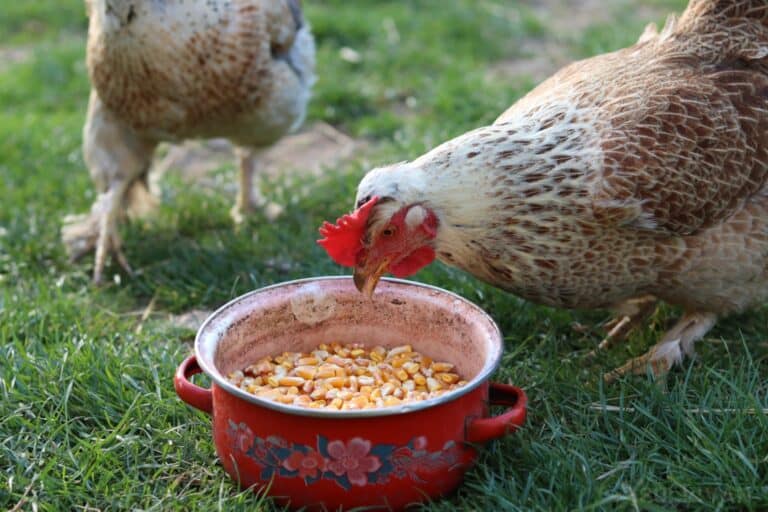
While chickens can eat just about anything, there are a few things they should not be fed – and some foods that they simply don’t like all that much.
Here is a full list of feeding your chickens so you know just what they can (and should not) snap up with their opportunistic little beaks.
1. ✅ Grain
A solid meat bird or layer ration should be at the heart of your feeding regimen for your chickens. Available in mash, pellet, or crumbled form, chicken feed is uniquely formulated to provide your birds with everything they need to be healthy.
This should be the cornerstone of your flock’s diet – everything else is just extra.
Make sure the grain or feed mixture you select is matched with the appropriate kind of chickens you are raising.
For example, if you are raising laying hens, choose a layer feed. This has more protein and added calcium to help your girls lay lots of eggs for you. A broiler feed is necessary for meat birds, and chick starter is required for young birds.
2. ✅ Mealworms
A great treat to try for chickens is mealworms. You can buy some or grow your own. Either way, they can be used to help train your flock to certain commands and are super high in protein, making them a healthy option for most birds.
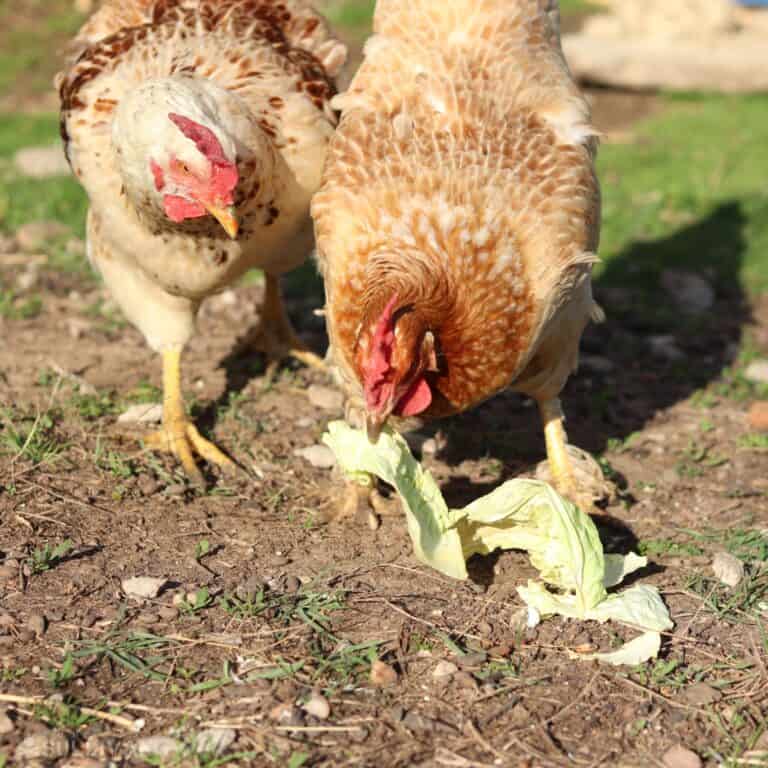
3. ✅ Most Vegetables
Chickens can – and love to! – eat most kinds of vegetables. There are a few minor exceptions, which we will detail below, but feel free to feed your chickens any parts of the following vegetables and their plant parts:
| Arrowroot | Chicory |
| Horseradish | Peas |
| Daikon radishes | Arugula |
| Summer squash (zucchini, crookneck, etc.) | dandelion greens |
| Belgian endive | Carrots |
| Eggplant (don’t feed the plants or peels – these contain solanine and can be toxic) | Artichoke |
| Green and red cabbage | Cauliflower |
| Corn | Celery |
| Brussels sprouts | Beets |
| Jicama | Celeriac |
| Cucumbers | Fennel |
| Bamboo shoots | Bok choy |
| Radishes | Fava beans |
| Collards | Parsnips |
| Fiddleheads | Green beans |
| Broccoli and broccoli rabe | Cassava |
| Kale | Kohlrabi |
| Lettuce | Leeks |
| Cultivated mushrooms | Okra |
| Radicchio | Mustard greens |
| Peppers (don’t feed the plants – these contain solanine and can be toxic) | Rutabagas |
| Snow peas | Sorrel |
| Swiss chard | Cooked potatoes |
| Spinach | Sweet potatoes and yams |
| Watercress | Turnips |
| Winter squash (spaghetti, butternut, acorn, Hubbard, etc.) | Tomatoes (don’t feed the plants – these contain solanine and can be toxic) |
| Tomatillos |
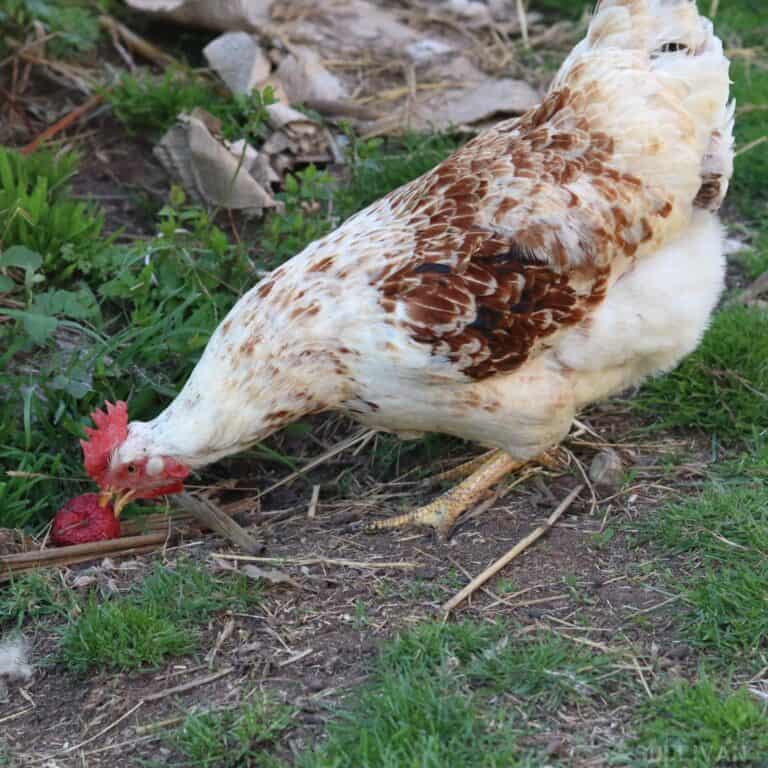
4. ✅ Most Fruits
As with vegetables, chickens can eat most fruits and the plants that grow these fruits. You might feed your chickens options such as:
| Pineapple | Cherries (without the pits) |
| Cantaloupe | Cranberries |
| Blackberries, raspberries, blueberries, and strawberries | Elderberries |
| Coconut | Bananas |
| Grapes | Kiwi |
| Currants | Mulberries |
| Dates | Honeydew melon |
| Mangoes | Apricots |
| Loganberries | Figs |
| Apples | Plantain |
| Plums | Persimmon |
| Quince | Watermelon (a great option for super hot summer days!) |
5. ✅ Almonds and Other Nuts
As long as you aren’t feeding nuts every day and they haven’t gone rancid, almonds, walnuts, peanuts, and all associated products (like peanut butter, as long as there isn’t too much added sugar) offer a great way to supplement your flock with the healthy fats and protein they need.
6. ✅ Alfalfa
Alfalfa is another nutrient-rich food you can feed your chickens. You can feed them processed alfalfa cubes, or grow alfalfa for them to graze on.
7. ✅ Ants and Other Bugs
Just about any bug is fair game when it comes to feeding time with your chickens.
8. ✅ Herbs
Almost all herbs are not only safe for chickens to eat but also incredibly good for them, too. Many offer medicinal benefits, meaning they can help keep away parasites and various diseases as well.
Some good options include:
| Basil | Oregano |
| Thyme | Marjoram |
| Lemon balm | Rosemary |
| Sage | Chives |
| Chamomile | Mint |
9. ✅ Bean Sprouts
While you don’t want to feed your chickens dry beans (more on this below) bean sprouts are incredibly good for backyard birds.
Not only are they rich in protein, fiber, and vitamins like folate, but they also are inexpensive to sprout yourself at home.
10. ✅ Birdseed
Birdseed is another food that’s totally fine to feed your chickens. Just be sure to feed it to them in a spot where wild birds can’t get to it since this can lead to the spread of disease in your flock.
11. ✅ Black Soldier Fly Larvae
Another super healthy, high-protein treat you can make at home, black soldier fly larvae are inexpensive to make.
12. ✅ Bread
Feed bread in moderation and try to stay away from bread that is overly moldy, as this can contaminate your flock with various mycotoxins. It doesn’t have a ton of nutritional value but it’s still less wasteful than just throwing it out!
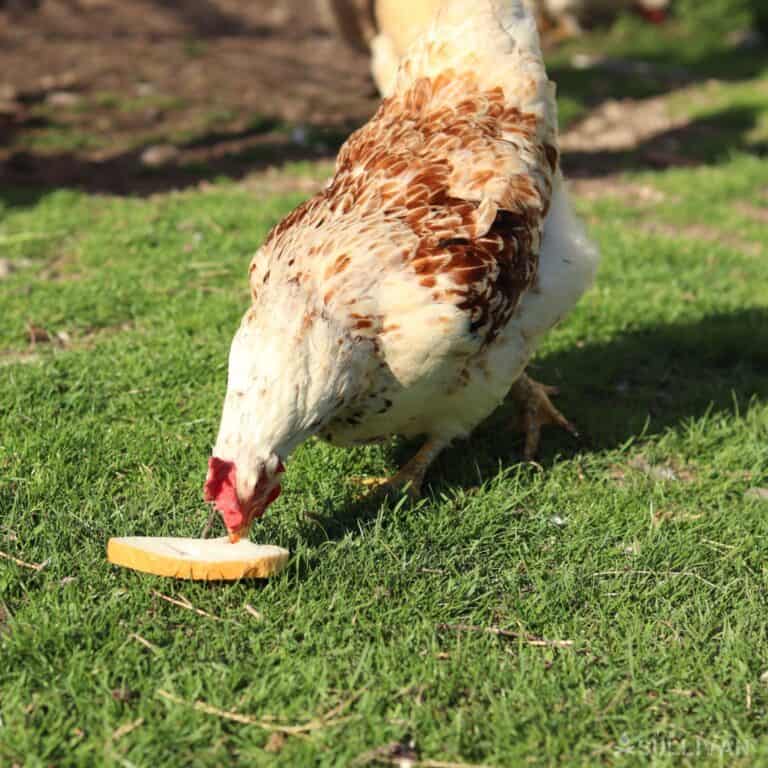
13. ✅ Cat, Dog, and Livestock Food
If you have leftover cat, dog, or livestock food (like pig feed, goat feed, or sheep feed), feel free to give it to your chickens.
Cat and dog food should only be fed when your chickens are molting since it’s higher in protein, but it’s a good option nonetheless to reduce your household waste.
14. ✅ Cheese
All kinds of cheese can be fed to chickens, including hard cheese, soft cheese, and even cottage cheese.
Don’t feed too much at a time, since dairy is high in fat and calories, but know that it’s a good way to provide additional calcium. Again, make sure the mold is cut off.
15. ✅ Chicken
It sounds a little dark to include chicken on this list, but the reality is that chicken actually provides a good source of nutrients to the flock. They’re opportunistic omnivores, meaning they’ll eat practically anything – yes, even their own kind!
Just make sure you cook the chicken first to prevent the spread of salmonella.
16. ✅ Fish and Shellfish
Any kind of fish and shellfish can be fed to your chickens, including raw bits and bones that are left over when you clean the day’s catch.
17. ✅ Crickets
Chickens love crickets, both the kind you can allow them to forage for outside, as well as the packaged ones you buy at the store.
18. ✅ Edamame
Edamame is okay to feed to chickens, but only cooked – do not feed uncooked soy.
19. ✅ Eggs
Both eggs and eggshells can be fed to your chickens. If you feed the actual egg, make sure you cook it first. Otherwise, this can lead to problems with your chickens eating their own eggs.
When fed out correctly, though, eggs offer a wonderful source of calcium that your chickens need to lay healthy eggs.
20. ✅ Flaxseed
Loaded with omega-3s necessary for the formation of healthy and nutritious eggs, flaxseed is another good food to consider feeding your chickens.
21. ✅ Grass Clippings and Weeds
As long as they have not been treated with pesticides, herbicides, or fertilizers, grass and weeds are all fine to feed your chickens.
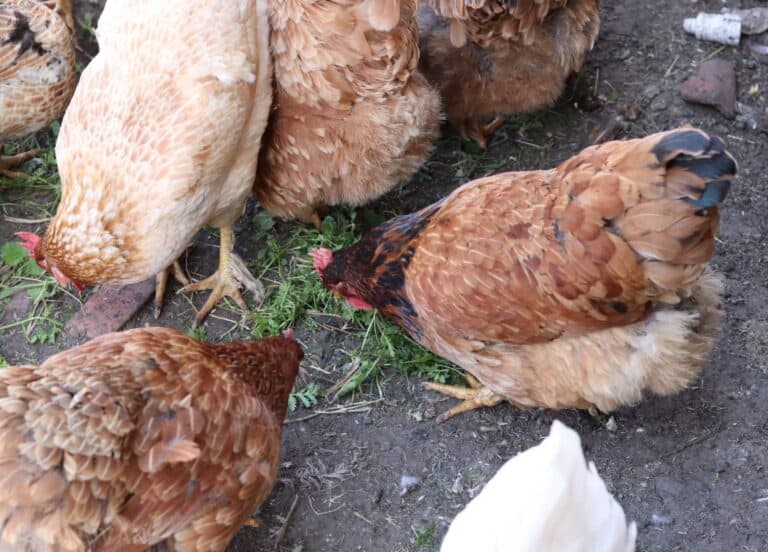
Make sure you don’t cut the grass too long, though, as longer pieces can cause your chickens’ crops to become impacted.
22. ✅ Pork and Beef
It’s fine to feed your chickens any kind of meat, but make sure it’s cooked first to reduce the potential for disease spread.
23. ✅ Rodents and Snakes
Don’t rush out to the pet store to buy mice and snakes to feed your chickens – this isn’t very efficient or cost-effective!
However, don’t panic if you see your girls swooping up mice to nibble on from the yard. Both snakes and rodents are totally fine for chickens to eat.
24. ✅ Nightcrawlers
Chickens love eating nightcrawlers and they’re high in protein. If you have kids, set them to work gathering up nightcrawlers after a rainstorm – they’ll love feeding them to your chickens!
25. ✅ Oats
Oats, both cooked and raw, can be fed to chickens. In fact, it’s a great idea to feed your chickens hot bowls of oatmeal on cold winter days – it can warm them up as they digest it!
26. ✅ Popcorn
Popcorn can be fed to chickens but make sure it is unbuttered and unsalted to be safe.
27. ✅ Pumpkins and Pumpkin Seeds
Both pumpkins and pumpkin seeds can be fed to chickens, too. Just make sure you haven’t used anything to treat the exterior of your pumpkin (like if you carved it and used a preservative to keep it looking fresh).
Another benefit of feeding pumpkins and their seeds is that this is a fantastic natural dewormer.
28. ✅ Rice
It’s fine to feed any kind of rice to your chickens – but make sure it’s cooked first. Uncooked rice can lead to serious digestive problems.
29. ✅ Seaweed
Do you live near the ocean? If so, you may want to consider feeding your chickens some seaweed. They’ll love it!
30. ✅ Sunflower Seeds
Sunflower seeds, like pumpkin seeds, are also a great source of nutrients for your chickens. They’re high in protein and healthy fats and are great for birds who are molting.
31. ✅ Wheat
You can even feed wheat, both processed and fresh, to your chickens.
32. ✅ Yogurt
Yogurt offers a ton of probiotics that are helpful when it comes to improving the immune functioning and intestinal health of your chickens. Don’t feed it every day, though, as too much dairy isn’t the best thing in the world for your flock.
20 Foods Chickens Should Not Eat
Here’s a quick table with what to avoid feeding them before I explain why:
| ❌ Raw Amaranth | ❌ Apple Seeds |
| ❌ Pits | ❌ Avocado |
| ❌ Chocolate | ❌ Butter |
| ❌ Coffee and Coffee Grounds | ❌ Nightshade Plants |
| ❌ Fried Foods | ❌ Dry Beans |
| ❌ Maggots | ❌ Wild Mushrooms |
| ❌ Raw Potatoes, Sprouts, and Peels | ❌ Rhubarb |
| ❌ Raw Meat | ❌ Xylitol |
| ❌ Alcohol | ❌ Tea and Tea Bags |
| ❌ Uncooked Rice | ❌ Green Potatoes |
1. ❌ Raw Amaranth
Although it is perfectly fine to feed your chickens cooked or extruded amaranth, you should avoid giving it to them raw. It contains ingredients that can depress their growth.
2. ❌ Apple Seeds
While bits and pieces of apple are fine to feed, avoid just giving them the seeds. They contain cyanide, which can be harmful and even lethal in large quantities.
3. ❌ Pits
It’s also fine to feed stone fruits, like nectarines and apricots, but always remove the pit first. This can kill your chickens.
4. ❌ Avocado
As with stone fruits, avocados have pits. However, they also contain persin, which can be fatal.
5. ❌ Green Potatoes
Green potatoes have a compound called solanine which is toxic to chickens. You should never feed them the green part of these tubers. This green pigment indicates the formation of chlorophyll through a process called greening.
6. ❌ Butter
Butter and oil are both too fatty for chickens to digest – and they don’t add a lot of nutritional value, anyway.
7. ❌ Chocolate
As with dogs, chocolate can be toxic to chickens. Don’t feed it to them.
8. ❌ Coffee and Coffee Grounds
Coffee and coffee grounds both contain caffeine – yes, even decaf! Don’t offer your chickens a cup of Joe.
9. ❌ Nightshade Plants
While you can feed tomatoes, eggplant, and peppers to your heart’s content, don’t feed the plant parts of these to your chickens (that includes leaves, stems, and peels). They contain solanine, which can kill your chickens.
10. ❌ Fried Foods
Avoid feeding overly processed and fried foods to your chickens, like hot dogs or French fries.
11. ❌ Dry Beans
Cooked beans are perfectly fine to feed to your chickens, but avoid feeding dry beans at all costs.
12. ❌ Maggots
This is one food that many people feed their chickens, and it’s up for debate as to whether it’s actually safe. In most cases, you’re probably fine to feed maggots, but the problem is that they can be contaminated with botulism. You might be better off steering clear.
13. ❌ Wild Mushrooms
While store-bought mushrooms are fine to feed chickens – and are a great source of nutrients and antioxidants – you should avoid giving them ones that you have foraged for in the wild. There’s the potential that you could give them a toxic variety that could kill them.
14. ❌ Raw Potatoes, Sprouts, and Peels
Cooked potatoes are fine, but don’t give your chickens raw potatoes or their sprouts or peels. They, too, contain solanine, which is extremely harmful to chickens.
15. ❌ Rhubarb
Avoid feeding your chickens rhubarb, which contains oxalic acid. Oxalic acid can cause organ failure in excess.
16. ❌ Raw Meat
Cooked meat is fine, but don’t give your chickens any kind of raw meat. It can spread disease.
17. ❌ Xylitol
Xylitol is an artificial sweetener found in many kinds of products. Avoid giving it to your chickens, as it can make them sick (and doesn’t add any nutritional value, either).
18. ❌ Alcohol
I sincerely hope you haven’t been offering your chickens a tipple – but if you have, stop immediately. There’s no nutritional value here and it can be quite dangerous.
19. ❌ Tea and Tea Bags
As with coffee and coffee grounds, you also need to avoid giving tea and tea bags to your chickens. Loose, caffeine-free tea leaves are probably okay, though.
20. ❌ Uncooked Rice
No uncooked rice for your chickens, please – it can be quite dangerous as it can expand in their stomachs.
10 Foods Chickens Aren’t Fond Of (Should Be Fed in Moderation)
1. Asparagus
The jury is out on whether asparagus is safe or not for chickens to eat. Most people say it’s probably fine, but it can cause an off-flavor in your eggs, so feed it only in moderation.
2. Cured Olives and Pickles
You can give your chickens jarred goods like pickles and olives, but do so in moderation. These are often brined in a salt-laden solution, and too much salt isn’t good for your birds.
3. Citrus
As with asparagus, people can’t seem to agree on whether it’s safe to feed citrus fruits to a flock of chickens. In my experience, chickens won’t usually touch the fruits anyway, so it’s probably a moot point.
You can try to feed chickens fruits like oranges, lemons, and limes, but be mindful of the fact that they’ll probably leave them be (and if they do eat them, it can cause an off-flavor in the eggs in excess).
4. Garlic
Garlic is safe for chickens to eat and actually offers a variety of medicinal benefits, and is a great natural de-wormer. However, it can flavor the eggs.
5. Onions
As with citrus fruits, most people say not to feed their chickens onions – but mine have never been fond of them anyway. They won’t hurt them but can cause a poor flavor in the eggs.
6. Pasta
Pasta is fine to feed to your chickens in moderation. However, it is high in calories and low in nutrition, so feed this out in moderation.
7. Quinoa
You can feed quinoa to your chickens, but do so in moderation – and only after it has been washed and cooked. Raw, it contains saponins that chickens aren’t overly fond of.
8. Snails
You can feed your chickens snails, but be careful about where they come from. They can harbor gapeworm, which can make your chickens sick.
9. Cereal
Like bread and pasta, cereal is fine to feed, but I would avoid the overly sugary varieties. Also, be mindful of the fact that it is low in nutrients, and should only be fed as an occasional treat.
10. Scratch Grain
Scratch grain is sold by most feed stores as a regular treat for chickens. While you can certainly treat your girls with the occasional handful of scratch grain (it’s a wonderful training tool, in fact!) there’s not a lot of nutrition here and it’s calorically dense, so use it only occasionally.
Feed Your Chickens….With Just About Anything!
As you can see, there are tons of foods that chickens can eat and very few that they cannot. Feel free to get creative in your approach – not only is it fun to give your chickens tasty treats, but it can help cut down on your feed bill, too.
Just remember to make a good, balanced feed that’s formulated specifically for your girls the main source of nutrition – everything else is just a bonus!
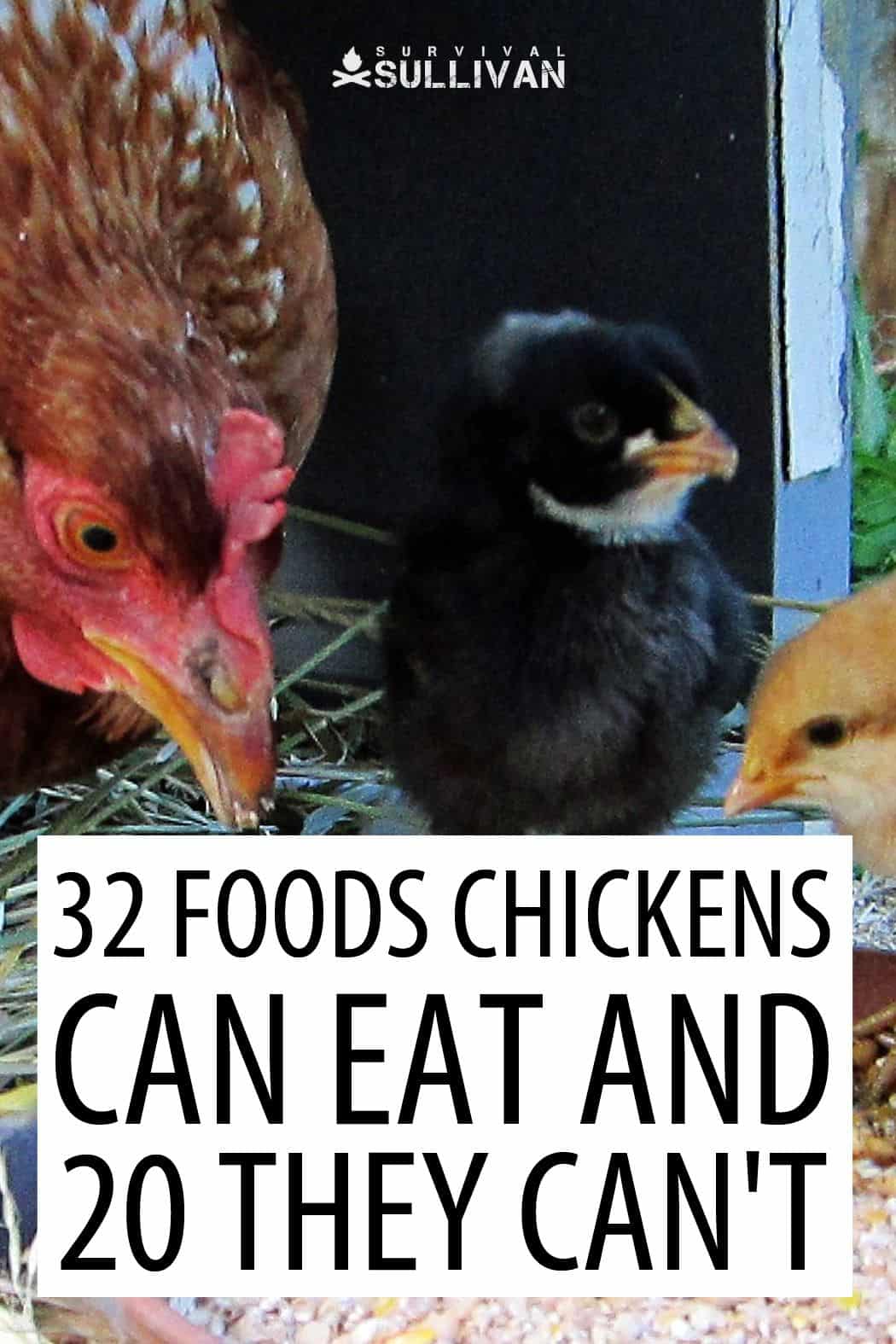

Although I teach high school English by day, I’m also the proud co-owner of a small, twenty-two acre property in New York (my second job and favorite pastime). We raise chickens, pigs, bees, and vegetables on our “homestead” and are proud to call our little slice of heaven home! When I’m not wrangling chickens or harvesting massive quantities of zucchini, I enjoy writing about common homesteading topics and other subjects.

Hi, thank you for this chicken feed information. I have read elsewhere that it is not good to feed moldy food to chickens, and although you do mention to cut mold off on food that is not too moldy, I am concerned about mold spores that have spread throughout the food beyond where the spot(s) lie. Although certain moldy food may be ok, I go by an old adage…’When in doubt, throw it out.’ Again, thank you for your information. I always appreciate and enjoy your newsletters.
Question; how can uncooked rice expand in a chickens stomach when it is ground in the gizzard first?
because the rice expands with the fluid in the chicken’s crop, it will make the crop swell up to the extreme and can cause the chicken’s death. The moment the crop swells so much, inevitably infection also sets in. There are so many healthy foods to feed a chicken, why would you want to feed something like dried foods that can hurt and harm them?
It’s a myth that chickens cannot eat uncooked rice. They evolved to eat seeds and grains in their natural state, yes, it would be ground in the gizzard, before it could reach the stomach. I feed uncooked rice to my chickens regularly, since I get it free as food that is tossed out. NONE have died. Even if you assume that if COULD expand in their stomachs, they would have to consume a large amount of water to cause any real large expansions, given how much rice grows when it absorbs water. I’ve never seen my chickens drink more than a few sips here and there at a time.
But this is also a site that claims that garlic will boost a chickens immune system.. so… *eyeroll*
This is good to know. Especially for people who are just starting out.
In time mum and dad may decide to get chickens and this list will a great help.
we were discussing raising minnows as part of an aquatic/hydroponics system >> special protein supplement diet for the chickens ….
Feed them mice… and they make grow to be mousers… I did it and it worked.
Oats and oatmeal cannot be digested and in chicks are a definite cause of pasty butt. Instead of lubricating the gut like in humans, it has an opposite effect. Don’t feed oats or oatmeal..